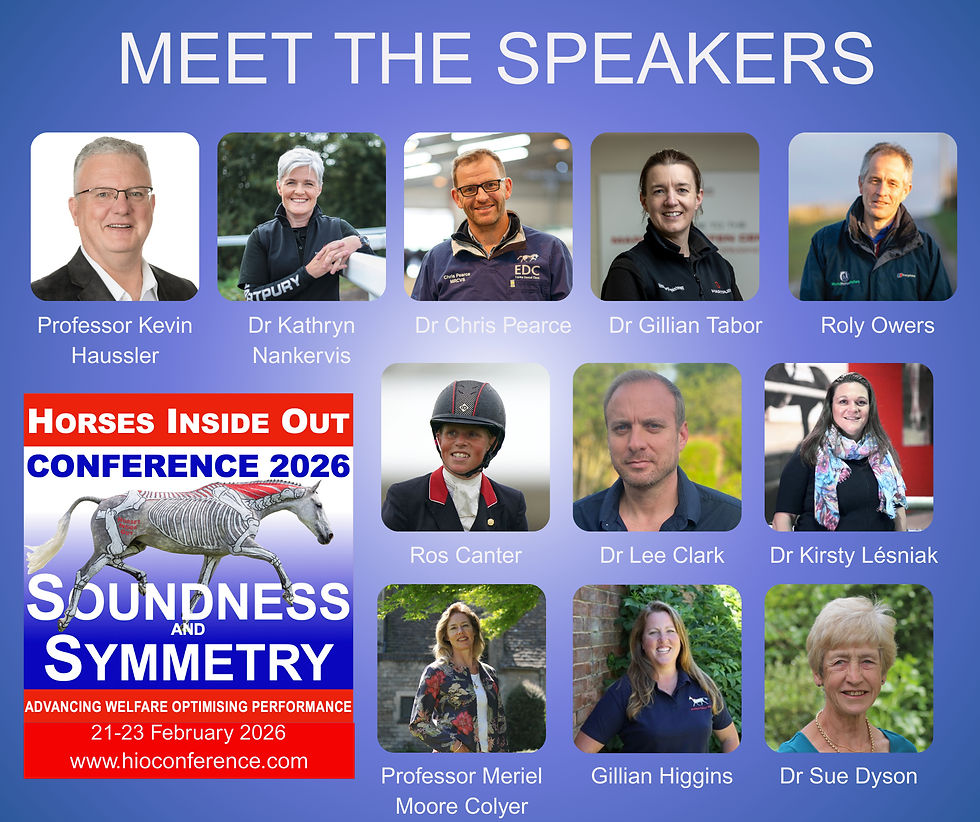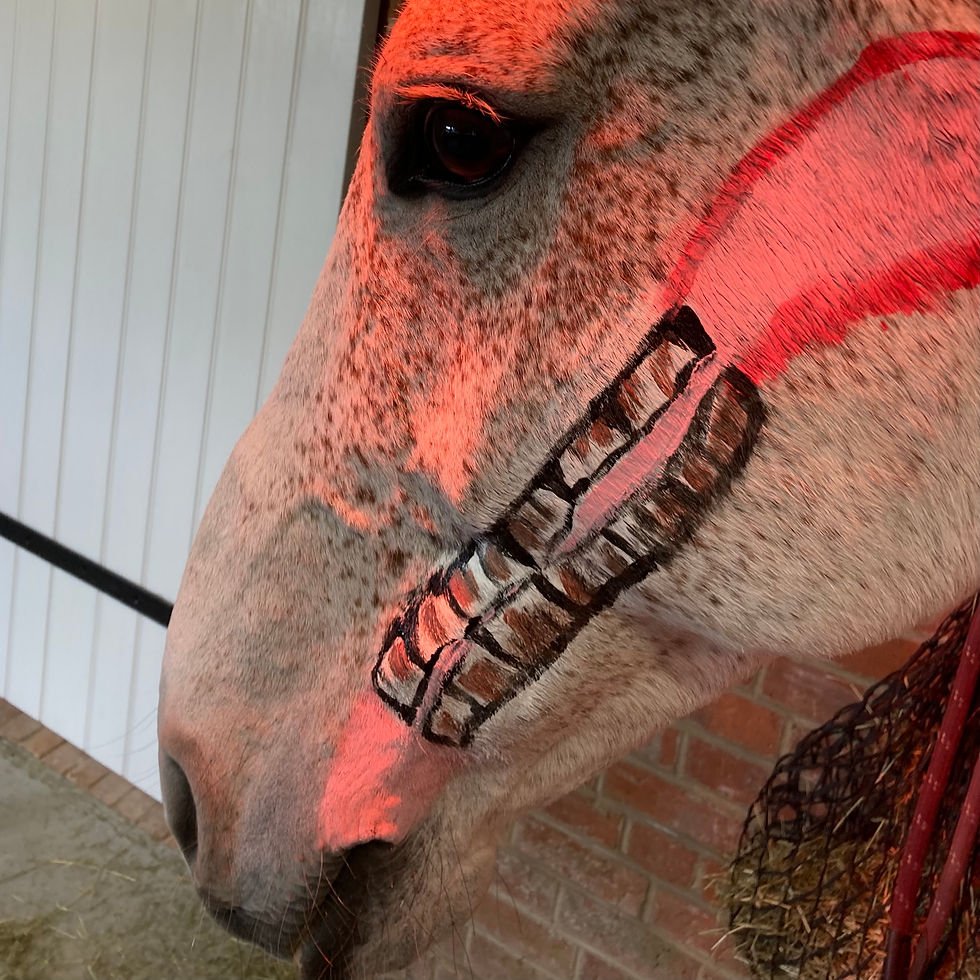How Do I Know My Horse’s Teeth Are Being Properly Cared For?
- Dr Chris Pearce

- Nov 3, 2025
- 4 min read
In the second article looking at equine dental care, Dr Chris Pearce from the Equine Dental Clinic explains why it’s crucial to choose the right, properly qualified professional and what to look for when selecting someone to care for your horse’s teeth.

Choosing the Right Dental Care for Your Horse
With so many professionals offering equine dental services across the UK, it can be difficult to know who is best qualified and what level of care your horse truly needs. One of the most common and most important questions horse owners ask is: “Who should I trust to look after my horse’s teeth?”
The short answer? It depends. The longer answer involves understanding qualifications, experience, and approach, all of which vary considerably among practitioners.
Understanding Who Does What
There are four main categories of people providing equine dental care in the UK:
Veterinary Surgeons
Equine Dental Technicians (EDTs)
Professionals who are both vets and qualified EDTs
So-called “Equine Dentists” without formal training
Let’s look at each of them in more detail.
Veterinary Surgeons

Veterinary surgeons have one key advantage: they can sedate horses and administer medication, including pain relief and local anaesthetic. However, not all vets are equally experienced in dentistry, some may have had only limited training or may not focus on this area of practice.
The ideal situation is when a vet is also a qualified Equine Dental Technician (EDT), meaning they’ve passed specific exams in equine dentistry. This combination of veterinary knowledge and technical skill provides excellent all-round care.
Some vets go further, becoming RCVS Advanced Practitioners in Equine Dentistry. This academic qualification demonstrates deeper knowledge, though it doesn’t always equate to advanced practical ability.
At the very top are RCVS-Recognised Specialists in Equine Dentistry — highly trained veterinary surgeons recognised by the Royal College of Veterinary Surgeons (RCVS) as true experts in the field. You can find them listed on the RCVS website.
For complex or advanced dental cases, an RCVS Specialist is the gold standard of care.
However, even a specialist may focus mainly on referral and advanced cases rather than routine rasping, so experience and current caseload still matter.
Equine Dental Technicians (EDTs)
Qualified EDTs can provide excellent routine care, particularly when dental work is their main focus every day. They are trained specifically in equine dentistry and often develop outstanding practical skill.
That said, EDTs are not vets, meaning they cannot legally sedate horses, diagnose disease, or provide medical treatment. A good EDT will always refer your horse to a vet if they detect something unusual — much like a farrier would refer a lameness issue.
To ensure high standards, always choose a technician who is a member of the British Association of Equine Dental Technicians (BAEDT). Membership requires rigorous examinations, ongoing professional development, and adherence to a strict code of conduct.
Professionals Who Are Both Vets and Qualified EDTs
This group offers the best of both worlds. They can sedate and medicate as vets while also being trained and examined in dentistry like EDTs.
These professionals are often highly competent in both routine and advanced procedures, providing comprehensive care from a single provider — a combination that is increasingly popular among discerning horse owners.
“Equine Dentists” Without Formal Training
Unfortunately, some individuals describe themselves as “equine dentists” without holding any recognised qualification. These people are unregulated, uninsured for clinical negligence, and may pose serious risks to your horse’s health and welfare.
Always ask to see proof of qualifications, professional memberships, and insurance before allowing anyone to work on your horse’s mouth.
What Else Should You Look For?
Ensure your horse’s teeth are in the best hands with these practical tips
Ask about focus and experience. How much of their work is equine dentistry? Someone who spends 90–100% of their time doing teeth will have greater practical expertise.
Look for sedated oroscopic examinations. The modern gold standard involves examining the mouth with an oroscopy camera under sedation, allowing every surface of the teeth to be seen and assessed. This helps detect issues that might otherwise be missed.
Consider reputation and recommendations. Word-of-mouth is valuable, but be mindful that “we’ve always done it this way” doesn’t necessarily mean it’s the best or most up-to-date approach.
Schedule periodic vet checks. If your routine dental care is provided by an EDT, arrange a sedated oroscopic exam by a dental vet every 2–3 years to ensure nothing is being overlooked.
Your Horsey Dental Checklist
For routine rasping. A dentistry-focused vet or qualified EDT is ideal.
For advanced care or sedation. Always use a vet — preferably one with additional dental qualifications or specialist recognition.
For complex or referral cases. Seek an RCVS-Recognised Specialist in Equine Dentistry.
For everyday care, choose someone who is qualified, experienced, passionate, and performs dentistry daily — but who also understands their limitations and will refer your horse when necessary.
A Key Member of Your Horse's Team
Your horse’s dental health relies on choosing the right professional and should be someone who combines knowledge, skill, and integrity.
The best equine dental practitioners are those who are dedicated, stay current with modern techniques, and always put your horse’s welfare first.
Dentistry, Performance and Beyond with Dr Chris Pearce, premieres on Wednesday 12th November 2025.
The dentistry chapter of The Bare Bones of the Matter online series takes a detailed look into equine dental health. Exploring how dental pain can impact performance, the key problems every horse owner should recognise, and some of the most misunderstood areas of the head - including the hyoid, TMJ, and incisor balance.
Gillian and Chris also discuss what a modern dental examination should include, helping owners understand what to expect. If you want a soft, consistent contact and a horse that feels comfortable in its mouth and head, you won’t want to miss this eye-opening chapter.
Chris will also be presenting at our Conference - Soundness and Symmetry. He will be discussing The link between dentistry, lameness and symmetry. Chris will explore the often-overlooked connections between dental health, musculoskeletal function, and movement symmetry, helping you to understand how oral discomfort can influence biomechanics and contribute to lameness or postural issues.



Comments